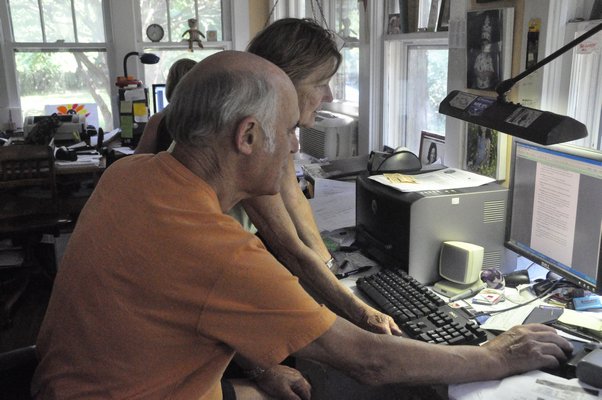
When Martin Shepard met Judith Peters 42 years ago in an elevator on West 96th Street, he had no choice but to hit on her.
It worked. The next day, they were on their first date.
“I saw her the day after, and the day after, and the day after,” Mr. Shepard smiled, leaning back in his chair. “Judy was really a scrumptious-looking woman when I met her. I mean, she still is, for 78.”
His now-wife pursed her lips, pointing out that they are the same age, though he is older by six months.
“We’ve been together ever since,” she sighed playfully, sitting on an adjacent couch on Tuesday afternoon in their Sag Harbor home. “So, here we are, after meeting in that elevator. Isn’t that a romantic place?”
It was a whirlwind love affair, they said, and a fateful accident—a common theme in their lives together, considering it was also by chance that they reinvented themselves as book publishers.
One day, about 35 years ago, Mr. Shepard was toying with reprinting one of the 10 books he had written on his field—psychology and psychiatry. The idea got him thinking.
He wrote a query letter to Thomas Lask, a columnist for the New York Times Book Review, seeking titles more than 20 years old. Next thing he knew, Mr. Shepard had 500 old manuscripts on his doorstep.
Together, the couple picked six books and published them under The Second Chance Press. Shortly after, they printed a small selection of new works under the imprint of The Permanent Press, which continues to thrive today in spite of its non-standard beginnings.
“We never applied for grants. We were never affiliated with any university. We just did it on our own,” Ms. Shepard said. “And in that sense, we were sort of unusual.”
Every year, The Permanent Press publishes approximately 16 books—narrowed down from roughly 5,000 submissions. Production costs are $10,000 per novel, Mr. Shepard explained, which requires them to sell at least 1,000 copies of each title to recoup the expense.
And in an industry where five conglomerates handle 85 percent of all publishing, Mr. Shepard said, it is a constant struggle to gain attention while refusing to compromise on the press’s standards.
“We try to limit our losses rather than take on best-sellers, which is very hard to do,” he said. “Most of the stuff coming out of the big houses is like most of the big summer movies. Short-on-character bodice-rippers. I don’t mind ripping a bodice every now and then, but I don’t like the way they treat it. And I’m too old for that stuff now.”
“We’re stubborn enough to do books we like,” his wife added, “even though we know they may not be terribly commercial.”
Despite the publishing house’s shoestring budget and humble roots, a number of the The Permanent Press’s regular stable of authors are receiving national attention. Chris Knopf—whose newest novel, “Cries of the Lost,” is slated to release in November—is one of five Nero Award finalists for his book, “Dead Anyway.” Jaden Terrell’s “Racing the Devil” is a finalist for the Shamus Award under Best First Private Eye Novel and Howard Owen’s “Oregon Hill” is a finalist for the Hammett Prize, awarded to literary excellence in the field of crime writing.
The reason for the success is simple. The Shepards only take on “good writers,” they said, and look for three crucial elements in every potential project: language use, character-driven plots and a unique edge.
Typically, the 5,000 submissions—which range from full manuscripts or 20 to 25 pages to synopses and letters of inquiry—start with Ms. Shepard. If she likes what she reads, she will move it from a basket in her dining room to the shelves underneath her kitchen nook. Most of them never see the second stage, she said, and are instead followed up by a “generic, but pleasant” rejection letter.
The submissions that most intrigue Ms. Shepard move upstairs to her office, where they are divided into a number of piles. The ideal spot to be is closest to her computer, she said, where she does most of her editing—which won’t happen until her husband signs off on the book as well.
“If she’s very hot for a book or I’m very hot for a book, we’re together usually 95 percent of the time,” according to Mr. Shepard, who handles the promotional and contractual side of the business. “And if she likes a book and I don’t, or I like a book and she doesn’t, we shut it down. We don’t have fights over it.”
“We don’t butt heads over that,” his wife said.
“No.”
“We could butt heads over other things,” she laughed.
“I leave too many things around. I don’t pick up my stuff. I have all these books here,” he listed off. “It goes on and on.”
The couple laughed together, and Mr. Shepard said, “If you have a wonderful partner, it makes it a really rich experience. All you want to do is wake up in the morning—I do, anyway—and work at the things you like to do.”
Ms. Shepard smiled warmly at her husband, who pushed himself up from his chair and headed toward his office. At the entryway, he slapped a safari hat on his head before continuing inside, his wife not far behind.
For more information, visit thepermanentpress.com.